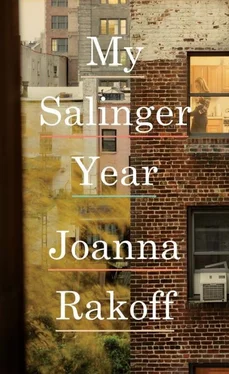“It could,” James agreed. What might this mean? Were they talking about the fan letters? That a computer would save me the labor of typing that form letter over and over and over? I smiled just thinking about this. They weighed on me, the letters: all those Salinger fans waiting for responses. A computer would help.
“See if they come in black,” my boss was saying, “and then we’ll talk. And confirm the numbers.”
“Okay.” James allowed himself a small smile. I could see that he was trying to decide whether to say what he did indeed say next. “Thank you.”
“Don’t thank me,” my boss said. “I’m not saying yes. And if I did say yes, it would only be for the Salinger stuff. I don’t want people on the World Wide Web all day, doing whatever they do.” She waved her hands around, to indicate the utter craziness that was the Internet. “I don’t want people”—she glanced in my direction and gave James a knowing nod—“e-mailing their friends in Zimbabwe all day.”
“I don’t think,” said James, with a wink at me, “that will be a problem.”
The next day, Pam dropped on my desk a thick envelope bearing rows of colorful foreign postage. Inside, I found the Other Client’s new novel, his first literary venture in a decade. He was on leave from teaching at the moment, staying with his wife’s family in New Zealand. “I just have a feeling about this,” my boss told Hugh and me, bouncing excitedly on her toes, the thick manuscript clutched to her chest. “This is going to be huge,” she told me the next morning. She’d read the entire thing in one night. “Prepare yourself for a multiple submission.” I nodded, afraid to open my mouth. Multiple submissions, I’d thought, were not the Agency way. But veering from the Agency way could only be a good thing for the Agency.
“It’s going to be a lot of work,” she warned me. Perhaps, I thought, this was her problem with contemporary agenting, or contemporary publishing, in general: not that it was unscrupulous, but that it was too taxing. Thirty years earlier, she could have sold this book on a one-page proposal and a handshake.
For a week, my boss consulted with Max, working and reworking a list of editors to whom she’d send the novel, many of them younger and unknown to her, outside her network of cronies. The manuscript was handed to me to be sent out for xeroxing—our office machine couldn’t handle twelve copies of a three-hundred-page tome—and while I waited for the messenger to arrive, I peeked at the front page. I’d been relieved, honestly, that my boss hadn’t asked me to read the novel. It sounded gruesome and sensational and vaguely misogynist, the sort of violent thriller sold in airports. The first pages showed this to be absolutely true. The narrator excruciatingly details a Grand Guignol scene in which he finds the bodies of three dead girls in an attic, arranged in a sort of diorama. The writing, sure, was elegant and precise, the tone controlled and engaging—almost masterful—but there was still something about those pages—something beyond the grotesque subject matter—that turned my stomach.
In the end, my boss was right: the book sold for a large amount of money, to a great editor, at the new literary imprint of a good publisher. A crossover literary thriller. Gold. “We did it!” my boss said, generously, to the group gathered near my desk. Had I ever seen her in such high spirits? I wasn’t sure. But I was happy—as all assistants are, perhaps—to see my boss happy. Ecstatic.
“ You did it,” I said, smiling. It was true.
“I suppose,” she said with a shrug. She was, I suddenly realized, an unlikely leader, a reluctant president. She disliked being at the center of attention, having us all at her beck and call. This was why she came and went with barely a word to me. Not out of hauteur. She was shy, quiet, retiring. “We’re going for drinks tonight. All of us.”
And so we filed out, at five, to the stark, 1980s-style restaurant around the corner and sat at the bar—birds on a wire—drinking cocktails. Outside the office, we had, somehow, nothing to say to one another, each of us too afraid of betraying allegiances. Only Carolyn and my boss made it past the first round. The rest of us filed out quickly, pulling on sweaters and light jackets. It was June, but still cold. The blizzard had set the tone for the rest of the year. At some point, things had to warm up.
The next week, a brown-suited deliveryman deposited a block of enormous boxes in the finance wing, across from the shelf that held Judy’s books. From my desk I watched James hunched over a mass of cables, setting up a hulking desktop PC. Decidedly putty colored. I stopped by on my way to the bathroom. “No black?” I asked.
“Sony actually makes a black desktop,” said James, smiling. “But it was a lot more expensive. Your boss decided it wasn’t worth it. She thinks computers are just a passing fad.”
“This is going to make form letters so much easier,” I said, crouching down beside him. “The Salinger fan mail, especially. Oh my God.” I wondered what would happen to my typewriter, the huge hulking mass of it. Perhaps they’d let me take it home. I’d come to love it, in a strange, Stockholm syndrome sort of way. And I imagined myself typing away the evening, seated at the blue schoolhouse desk I’d pulled in off the street, a stack of unblemished white paper to my left. Perhaps I would write a novel, the novel I’d been toying with, nervously plotting out, the typewriter’s whir and hum coaxing me into a meditative state.
James stood up and stretched. “Not really,” he said. I furrowed my brow in his direction. “This is the computer.” With the back of his hand, he wiped a sheen of sweat off his forehead. “ The computer.” Uncomprehendingly, I looked from James to the partially installed monitor. “We’re just getting one computer. Which we’ll all share. We’ll still type up correspondence on our Selectrics.”
“But—” I asked, hoping that I’d misheard something. “ Why ?” I looked at him a disproportionate sense of alarm filling me. “What’s this for?”
“We’ll use it to monitor copyright infringement. So, there are all these personal Web pages, right? And people are posting excerpts from Salinger and Fitzgerald and Dylan Thomas. We need to make sure that those excerpts are within the limits of fair usage. Which is eight hundred words or less for prose; five lines for poetry.”
“Oh,” I said, still stunned.
“Hugh can also use it for research so he doesn’t have to go to the library as much.” Hugh, I knew, would be deeply displeased by this suggestion. He loved going to the library. “And I think everyone else can use it, if they need to, just not for personal stuff.”
A few days later, my boss walked around the office rounding everyone up, then brought the lot of us—Lucy and Max laughing like high school kids—over to the computer, pristine and beige, its monitor dark. “Well,” she said. “We’ve done it.” She cast her eyes around at us, meaningfully. “This is the office computer.” She gestured to the keyboard. “Is it on?” she asked James. He shook his head no. “Okay, it’s not on,” she confirmed. Olivia looked at me and smirked. “We’ve put it here, right in the central part of the office, in full view, so that no one will be tempted to use it for personal e-mail or”—she paused, searching her mind for other activities in which one might engage with a computer—“ anything . People waste a lot of time on computers and we’re not going to have any of that. This computer is for research”—she nodded at Hugh, who nodded curtly back—“and for monitoring Agency business. If you need to use it for anything, just come to me and ask. But if I come out and see you sitting here, I’m going to assume you’re doing something you shouldn’t be doing.” Surveying our faces, she shook her head with exasperation, as if we were a pack of mischievous children entrusted to her care. “Okay?”
Читать дальше












